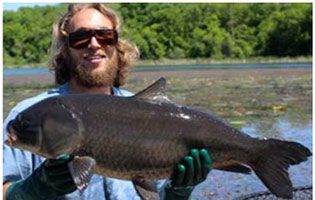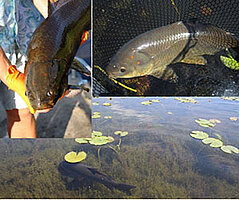Bigmouth Buffalo Ictiobus Cyprinellus Sets Freshwater Teleost Record as Improved Age Analysis Reveals Centenarian Longevity

Alec Lackmann is PhD candidate in Environmental and Conservation Sciences (Conservation Biology Track) at North Dakota State University. He holds a BA Mathematics (2013). Research specialization: Aquatic Ecology, Entomology, and Ichthyology.
Bigmouth Buffalo Ictiobus Cyprinellus Sets Freshwater Teleost Record as Improved Age Analysis Reveals Centenarian Longevity
We found Bigmouth Buffalo Ictiobus cyprinellus can live beyond 110 years, surpassing all other freshwater teleosts (~12,000 species) by nearly 40 years. We conclusively validated these ages via bomb radiocarbon analysis, making Bigmouth Buffalo the oldest age-validated freshwater fish. These age-data alone have potential to transform the management of this species, and change the perception of other closely-related taxa. For several endemic populations, spans of four and eight decades with no representative year classes suggest long term recruitment failure on a regional level. This paradigm-shifting life history data comes at a crucial point in this species’ history. Current harvest of Bigmouth Buffalo is almost completely unregulated across the USA, even as Bigmouth Buffalo are declining and are well-known scientifically as competitors with several of North America’s most invasive carp species. In addition, Bigmouth Buffalo face mounting threats. Not only are they valued as a food fish to both Native Americans and commercial harvesters, they are now also popular bowfishing targets. Bowfishing at night is a new, virtually unstudied, yet obviously growing form of harvest. Almost all US states do not require a bowfishing license, and most species targeted are native fishes with no limits established on their take, including Bigmouth Buffalo. There is also no mechanism in place for bowfishers to report their harvest. Thus, little is known regarding this new, and growing form of exploitation. Our findings reveal Bigmouth Buffalo and other catostomids require urgent attention.
We also report on novel, age-related external markings that accrue on Bigmouth Buffalo. These orange and black spots highly correlate with the age of the fish, providing a non-lethal means of age estimation as well as aid recognition of individual fish. We found that Bigmouth Buffalo reach asymptotic adult size around the age of 30-40 years, and there is a pronounced sexual dimorphism in their size structure (females are much larger than males at maturity). In addition, there is marked variation in adult size within each sex. Mature males typically range in size from 4-8 kg, and females in the range of 8-25 kg. Thus, a 4 kg, male Bigmouth Buffalo could be 100 years old. In fact, the oldest specimen in our research paper (taken by a bowfisher in 2018), was 112 years old. She was only 9.8 kg and 87 cm total length, on the smaller end of the mature females.
Overall, little was known about this North American species. Careful examination has revealed discoveries overlooked and management dilemmas that can arise as a consequence of the ecological neglect underappreciated species.
Co-authored with Drs. Mark Clark and Malcolm Butler (his advisors), Alec Lackmann (Ph.D. student and NDWRRI Fellow) published their research findings in Communications Biology, showing that a Bigmouth Buffalo fish could live up to 112 years! The related work recently has received a lot of attention in the press (please see the following details). Congratulations to Alec, Mark, and Malcolm!
Communications Biology: https://www.nature.com/articles/s42003-019-0452-0
National Geographic: https://www.nationalgeographic.com/animals/2019/08/oldest-freshwater-fish-discovered-radiocarbon-dating/
Minnesota Public Radio: https://www.mprnews.org/story/2019/06/10/new-appreciation-for-a-minnesota-fish-long-considered-junk
Minneapolis Star Tribune: http://www.startribune.com/record-catch-at-112-years-minnesota-fish-is-the-oldest-freshwater-fish-ever-verified/525677101/Newsweek: https://www.newsweek.com/bigmouth-buffalo-this-record-breaking-fish-was-alive-when-theodore-roosevelt-was-president-1452520
Science Alert: https://www.sciencealert.com/grandma-fish-is-so-much-older-than-we-thought-freshwater-fish-could-be
SYFY Wire: https://www.syfy.com/syfywire/112-year-old-fish-minnesotaNewswise: https://www.newswise.com/articles/ndsu-research-proves-midwestern-fish-species-lives-beyond-100-years
Peer-Reviewed Journal Papers
Lackmann, A.R., Andrews, A.H., Butler, M.G., Bielak-Lackmann, E.S., and Clark, M.E. 2019. Bigmouth Buffalo Ictiobus cyprinellus sets freshwater teleost record as improved age analysis reveals centenarian longevity. Communications Biology, doi: 10.1038/s42003-019-0452-0.
Conference/Seminar Presentations
Lackmann, A.R. 2019. Centenarian longevity for Bigmouth Buffalo. Minnesota and Dakota Chapter of the American Fisheries Society. Fargo, ND.
Lackmann, A.R. 2018. Bigmouth Buffalo, a North American Treasure. American Fisheries Society Subunit. Valley City State University, Valley City, ND (Oral Presentation).
Lackmann, A.R. 2018. Bigmouth Buffalo in the Red River of the North Basin: endemic, underappreciated, and unexpected. 1st NDWRRI Special Water Resources Seminar. North Dakota State University, Fargo, ND (Oral Presentation).
Lackmann, A.R. 2018. What you can do with accurate age data. Pelican Lake Property Owner’s Association (PLPOA) Subcommittee Angler’s Meeting, Detroit Lakes, MN (Featured Presenter).
Lackmann, A.R. 2018. What’s the value in aging fish? Pelican Lake Property Owner’s Association (PLPOA) 85th Annual Spring Meeting, Detroit Lakes, MN (Featured Presenter).
Lackmann, A.R. 2018. Can Bigmouth Buffalo live 100 years? Preliminary evidence of 80-year recruitment failure in Minnesota. Brown Bag Seminar, University of Minnesota, St. Paul, MN.
Lackmann, A.R. 2018. Can Bigmouth Buffalo live 100 years? Preliminary evidence of 80-year recruitment failure in this native fish. Northern Plains Biological Symposium, Fargo, ND.


Melcolm Butler
Biological Sciences
Office: Research 2, Room 214B
Phone: 701-231-7398
Email: malcolm.butler@ndsu.edu

Mark Clark
Biological Science
Office: Stevens 119
Telephone: 701-231-8246
Email: m.e.clark@ndsu.edu


